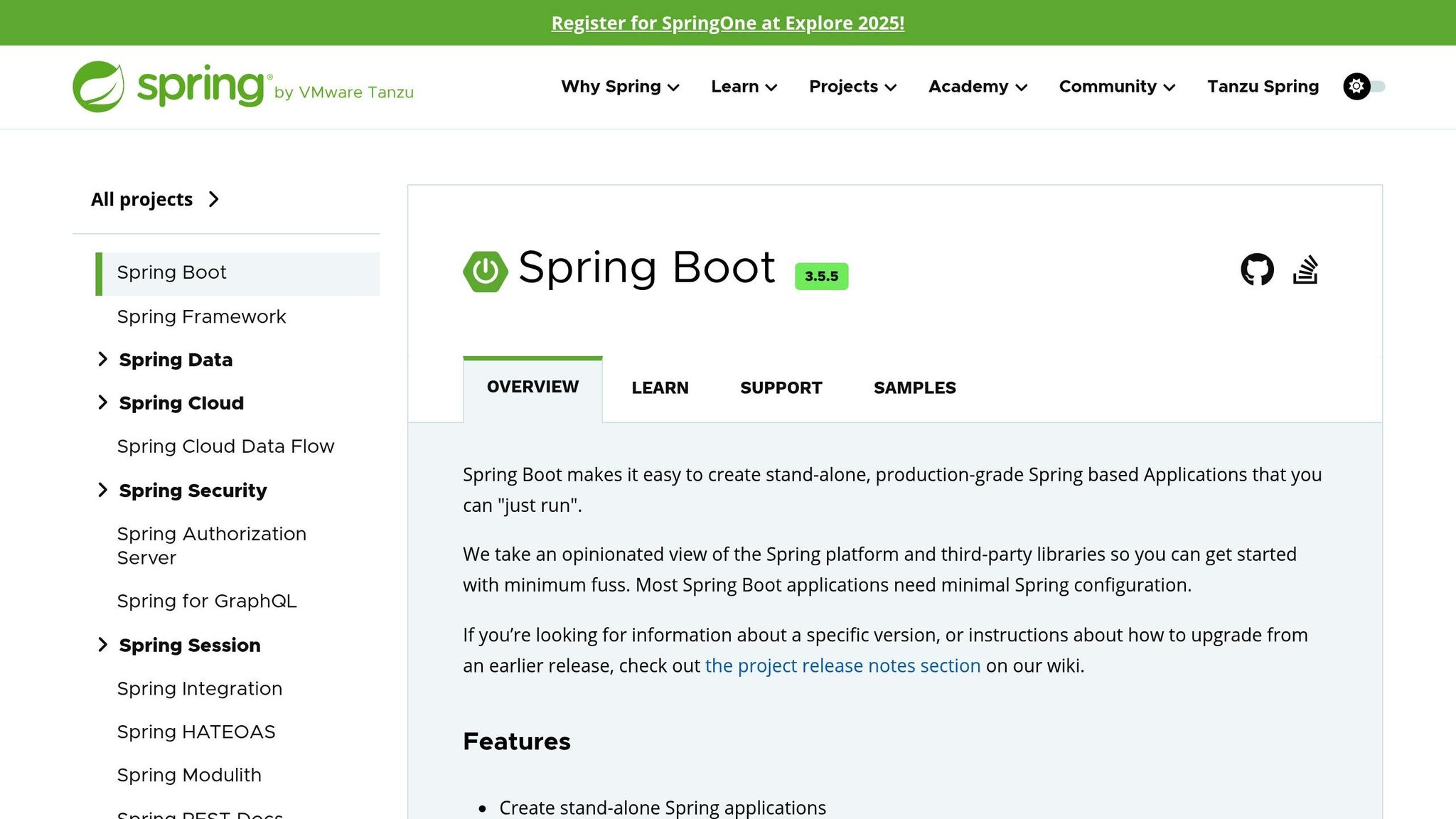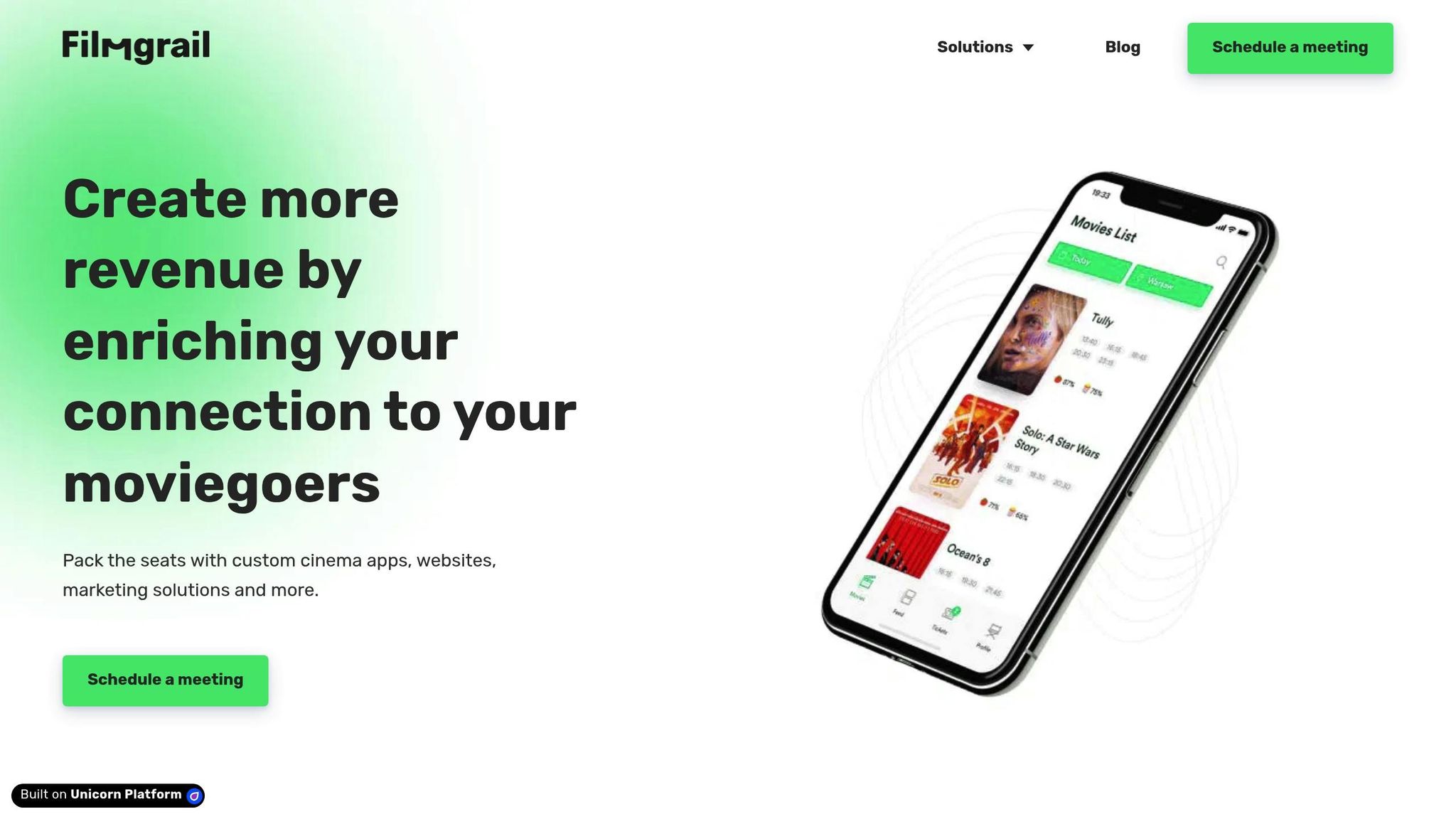Cinema Ticket APIs are the backbone of modern movie ticketing, enabling real-time seat availability, secure payments, and personalized experiences. They connect cinemas to apps, websites, and payment platforms, ensuring smooth operations and better customer satisfaction. Key features include dynamic pricing, loyalty program integration, and mobile optimization, all of which help theaters boost revenue and streamline processes.
Key Takeaways:
- Core Features: Real-time updates for showtimes, seating, and payments.
- Advanced Tools: Dynamic pricing, group bookings, and marketing automation.
- Customer Benefits: Easier checkout, personalized offers, and loyalty rewards.
- Operational Benefits: Reduced errors, smarter revenue strategies, and robust analytics.
Cinema Ticket APIs not only simplify ticketing but also enhance the overall movie-going experience, making them a must-have for theaters aiming to stay competitive.
Online Movie Ticket Booking System Project | Spring Boot + React JS + Razorpay Payment + Google Maps

Key Features of Cinema Ticket APIs
Cinema ticket APIs simplify operations and improve the movie-going experience. By understanding what these systems offer, cinemas can make informed choices to enhance their digital tools and get the most from their investment.
Core Features
Real-time showtime management is a must-have for any cinema API. It ensures that showtimes across all platforms are updated instantly. Whether a theater adds a late-night screening or cancels a show due to technical issues, the API reflects these changes immediately, avoiding customer confusion.
Seat availability tracking is essential to avoid overselling tickets. Advanced APIs provide real-time seating maps, showing which seats are available, reserved, or blocked. This feature is particularly valuable during the opening weekend of blockbuster films when every seat matters for revenue.
Secure payment processing supports various payment methods, including credit cards, digital wallets like Apple Pay and Google Pay, and buy-now-pay-later options. These systems also ensure strong security and compliance with PCI standards.
Movie metadata retrieval enhances the customer experience by automatically pulling in details like cast information, ratings, and promotional materials. This ensures customers have all the information they need to choose their next movie.
Booking confirmation and ticket delivery streamline the process by generating digital tickets with QR codes, sending confirmation emails, and integrating with mobile wallets. This allows customers to easily store their tickets alongside other essentials.
These core features lay the groundwork for more advanced capabilities that further boost revenue and customer satisfaction.
Advanced Capabilities
Dynamic pricing algorithms adjust ticket prices based on factors like demand, time of day, seat location, and historical sales data. For example, weekend evening shows may be priced higher, while weekday matinees could offer discounts to attract more viewers.
Loyalty program integration helps turn occasional visitors into regular patrons by automatically tracking purchases and rewarding customers based on set criteria.
Group booking management simplifies reservations for larger parties. Customers can book blocks of seats and handle complex payment situations, such as splitting costs among multiple people.
Content customization for regional audiences allows cinemas to cater to local preferences. APIs can prioritize specific genres, languages, or themes based on the demographics of each theater's location.
Marketing automation capabilities use customer data to create personalized campaigns. For instance, a horror movie fan might receive alerts about upcoming thrillers or special midnight screenings.
Mobile and Web Integration
Cross-platform compatibility ensures smooth performance across iOS, Android, and web browsers. APIs use responsive design and standardized protocols to adapt to any device or screen size without sacrificing functionality.
Offline functionality addresses connectivity challenges. Mobile apps can cache key information like showtimes and seat maps, enabling customers to browse options even without internet access. Purchases can then be completed once the connection is restored.
Push notification systems keep customers engaged by sending updates about upcoming releases, special offers, or reminders for advance bookings. Notifications can even be personalized based on viewing history.
Social media integration extends the cinema experience beyond the theater. APIs can connect with platforms like Instagram and Facebook, letting customers share their movie plans, post reviews, or see what their friends are watching.
Analytics and reporting capabilities give cinema operators valuable insights into customer behavior, peak showtimes, revenue patterns, and operational performance. This data helps in making smarter decisions about programming, staffing, and marketing.
Filmgrail combines these features seamlessly, offering efficient ticketing alongside engaging tools like auto-playing trailers and personalized notifications, blending operational efficiency with a better customer experience.
How to Integrate Cinema Ticket APIs
Integrating a cinema ticket API requires careful planning to ensure a smooth and efficient user experience. A well-executed integration minimizes errors, saves resources, and keeps customers satisfied.
Best Practices for Integration
Start with a sandbox environment. Before making changes to live systems, test everything in a sandbox. Many API providers offer these testing setups, which replicate real-world conditions without processing actual transactions. This allows your team to simulate different scenarios, verify functionality, and fine-tune the integration.
Secure your credentials. Use OAuth 2.0 or rotating API keys stored in secure environment variables. Avoid hardcoding sensitive data, and update keys every 90 days. If a team member leaves, revoke their access immediately to maintain security.
Control API call frequency. Most APIs have rate limits, so space out requests to avoid exceeding these thresholds. Use exponential backoff for retries instead of overwhelming the server with repeated calls.
Develop robust error handling. APIs can return various error codes for issues like sold-out shows, invalid payments, or temporary server outages. Your application should handle these gracefully, offering clear messages to users. For instance, if seats are unavailable, guide users to alternative showtimes instead of displaying a generic error.
Log critical data for troubleshooting. Keep track of timestamps, response codes, error messages, and transaction IDs. These logs are essential for diagnosing issues and spotting trends. Ensure logs are stored securely and set up alerts for unusual patterns like high error rates or slow response times.
By following these practices, you’ll establish a strong foundation for your integration. Next, focus on securing the system to protect user data.
Security Considerations
Protect payment information. Ensure compliance with PCI DSS standards by avoiding the storage of sensitive data like credit card numbers or CVV codes on your servers. Instead, use tokenization services provided by the API to handle payments securely.
Encrypt all communications. Use TLS 1.2 or higher to encrypt data in transit. Regularly update SSL certificates and monitor for outdated encryption methods that could pose risks.
Manage sessions securely. Use session tokens that expire after short periods of inactivity - 30 minutes is a common standard for ticket purchases. Require users to re-authenticate for sensitive actions like changing payment details or viewing purchase history.
Validate all inputs. Before sending data to the API, check for proper formats, acceptable value ranges, and potential injection attacks. For example, confirm that seat numbers are valid for the selected theater and that showtimes follow the required format.
Monitor for suspicious activity. Set up alerts for unusual behavior, such as repeated failed login attempts, abnormal booking patterns, or consistent API errors from specific IP addresses. Early detection can prevent larger security breaches.
Once security is in place, it’s time to focus on building a system that can handle growth and high demand.
Maintaining Scalability and Reliability
Use caching and webhooks. Cache frequently accessed data like movie schedules, theater layouts, and pricing to reduce API calls. Set appropriate expiration times - cache showtimes for 15 minutes under normal traffic but shorten it to 5 minutes during peak periods when updates are more frequent. Webhooks can provide real-time updates without additional requests.
Prepare for traffic surges. Big movie releases and special events can lead to sudden spikes in demand. Load test your system with realistic traffic patterns and consider implementing queue systems for high-demand showtimes to keep things running smoothly.
Stay updated on API changes. Regularly check for updates, new features, and deprecations from your API provider. Subscribe to developer newsletters and plan upgrades well before deadlines to prevent disruptions.
Build redundancy and failover systems. Temporary outages or network issues can happen, so design your system to handle them. Use circuit breaker patterns to detect unresponsive APIs and switch to backup systems or cached data temporarily, ensuring uninterrupted service.
Monitor performance in real time. Track metrics like response times, error rates, and transaction success rates using dashboards. Real-time insights help you identify trends, optimize performance, and scale resources before issues arise.
sbb-itb-b1b0647
Getting the Most from Cinema Ticket APIs
Once you've set up secure and scalable API integration, you can unlock a range of features to boost ticket sales and improve customer satisfaction. Modern cinema ticket APIs go beyond simple booking - they lay the groundwork for personalized experiences and smoother operations.
Boosting Ticket Sales
Cinema ticket APIs can help you sell more tickets by offering tools that drive urgency and upsell opportunities:
- Dynamic Pricing: Adjust ticket prices based on seat availability and demand. This approach helps maximize both occupancy and revenue.
- Real-Time Inventory Insights: Show limited seat availability during the booking process to encourage faster purchases. Creating a sense of urgency can nudge customers to complete their transactions.
- Upselling Opportunities: Use the API to suggest add-ons like concessions or parking passes. Offering tailored package deals can increase the value of each transaction.
- Targeted Promotions: Tap into customer data to send personalized offers. For example, if someone frequently watches a specific genre but hasn’t visited recently, an automated email with a discount for an upcoming release can bring them back. These targeted campaigns tend to outperform generic promotions.
These smart sales strategies not only boost revenue but also make the overall customer journey more engaging.
Improving Customer Experience
Cinema ticket APIs also play a key role in elevating the moviegoing experience. Here’s how:
- Simplified Checkout: Features like guest checkout, saved payment methods, and one-click purchasing for returning customers make transactions quick and hassle-free.
- Mobile Optimization: Ensure the API delivers a seamless experience on mobile devices. Fast loading times, easy navigation, and digital wallet integration are essential for today’s on-the-go users.
- Loyalty Programs: Reward frequent visitors with points for purchases, referrals, or social media interactions. These points can be redeemed for perks like priority seating or exclusive screenings, encouraging repeat visits.
- Proactive Problem-Solving: Use API data to tackle issues before they escalate. For example, if a showing is canceled, the system can automatically process refunds, notify affected customers, and suggest alternative showtimes - all without manual intervention.
- Flexible Booking Options: Allow customers to temporarily reserve seats, modify bookings, or request refunds easily. These features make the process more accommodating and enhance overall satisfaction.
How Filmgrail Powers Cinemas

Filmgrail takes the capabilities of cinema ticket APIs to the next level, offering tools that create immersive and engaging experiences for moviegoers. Here’s how they do it:
- Dynamic Content: Auto-playing trailers replace static images, building excitement and drawing users in. Video stories featuring behind-the-scenes footage, director interviews, or sneak peeks keep audiences connected and engaged.
- Community-Driven Reviews: Highlight local audience reviews and ratings to help customers make informed decisions. This approach fosters trust and builds a sense of community around the cinema.
- Data-Driven Insights: Filmgrail’s analytics tools provide valuable information about customer behavior, from popular showtimes to concession trends. This data helps cinema operators make smarter decisions about scheduling, pricing, and promotions.
- Mobile-First Design: With many customers discovering and booking tickets on their smartphones, Filmgrail ensures their apps are optimized for mobile. Features like fast loading times, intuitive navigation, and integrated payment options make the process smooth and enjoyable.
Conclusion
Building on the integrations and customer-focused features we’ve explored, here are some key takeaways and actionable steps to help cinemas make the most of ticket APIs.
Cinema ticket APIs play a crucial role in modernizing theaters by simplifying transactions, increasing revenue, and improving customer engagement.
Key Insights
The most successful implementations focus on smooth integration, outstanding customer experiences, and data-driven strategies. Features like real-time inventory updates, mobile-friendly platforms, and loyalty program integration directly impact ticket sales and customer happiness.
Offering flexible booking options, fast checkouts, and personalized promotions gives cinemas a competitive edge. APIs also enable advanced engagement strategies, such as sending targeted push notifications, showcasing community reviews, and delivering dynamic content like auto-playing trailers. These features transform the booking process into an engaging experience that keeps customers excited and coming back for more.
Next Steps for Cinemas
Here’s how theaters can put these insights into action to maximize the potential of ticket APIs.
Theaters looking to fully leverage ticket APIs should prioritize solutions that combine strong technical performance with engaging user experiences. Filmgrail’s platform is a great example, offering custom mobile apps, websites, and marketing tools designed to boost ticket sales and connect with moviegoers.
As discussed, investing in modern API solutions allows theaters to adapt effortlessly and prepare for future growth. Whether you want to implement features like dynamic pricing, enhance mobile usability, or use data insights to strengthen customer relationships, the right ticket API can become the foundation for lasting success.
Take a close look at your current booking system, identify its weaknesses, and consider upgrading to a powerful ticket API to drive sales, build loyalty, and stay ahead in a rapidly changing market.
FAQs
How do Cinema Ticket APIs improve the movie-going experience for customers?
Cinema Ticket APIs simplify the movie-going process by enabling quick and secure online ticket booking. With just a few taps on their mobile devices, customers can browse showtimes, select their preferred seats, and purchase tickets ahead of time. This means no more standing in long lines, making trips to the theater much more convenient.
These APIs also bring a personal touch by offering movie suggestions based on individual preferences, helping audiences find films they’re likely to enjoy. Features like digital tickets and streamlined payment options further enhance the experience, creating a smoother and more enjoyable visit that encourages customers to return.
What are the best practices for securely integrating a Cinema Ticket API with your theater system?
To safely connect a Cinema Ticket API with your theater system, it's important to follow these key practices:
- Secure authentication: Implement methods like OAuth 2.0 and require strong API keys or tokens to control access.
- Data encryption: Protect sensitive information by encrypting it during transmission and storage. Always use HTTPS to safeguard data in transit.
- Minimize data sharing: Only share the information absolutely necessary for the API to function, and ensure robust error handling is in place.
It's also wise to use centralized security tools like API gateways to monitor and manage access effectively. Stay proactive by keeping your API updated and regularly checking for vulnerabilities to guard against unauthorized access or potential attacks.
How can movie theaters use Cinema Ticket APIs to boost ticket sales and build customer loyalty?
Movie theaters can leverage Cinema Ticket APIs to enhance the ticket-buying process for their customers. Features like real-time seat selection, quicker checkout options, and personalized promotions make purchasing tickets smoother and more enjoyable.
These APIs also help theaters gather useful customer data, which can be used to craft loyalty programs and customized marketing strategies. This approach not only boosts ticket sales but also builds stronger connections with moviegoers, encouraging them to return and stay engaged over time.


